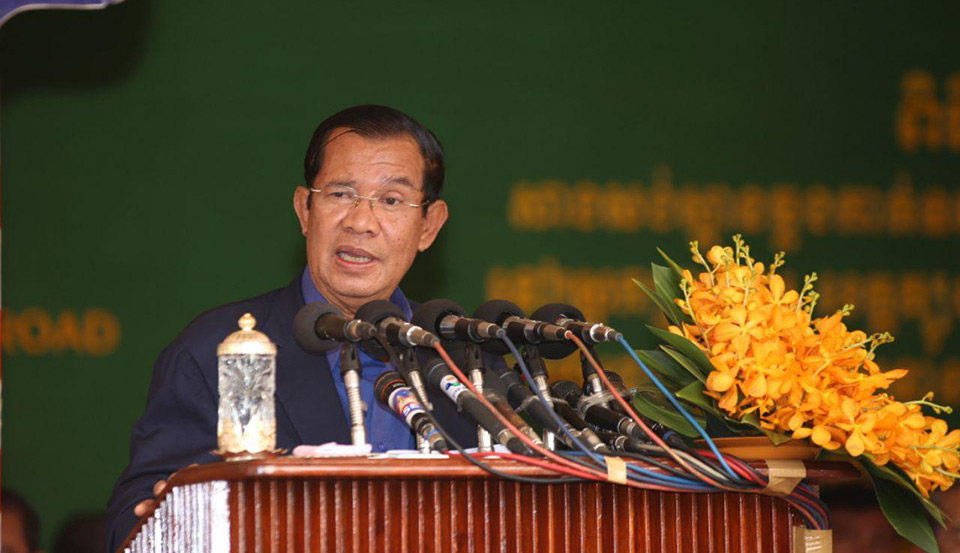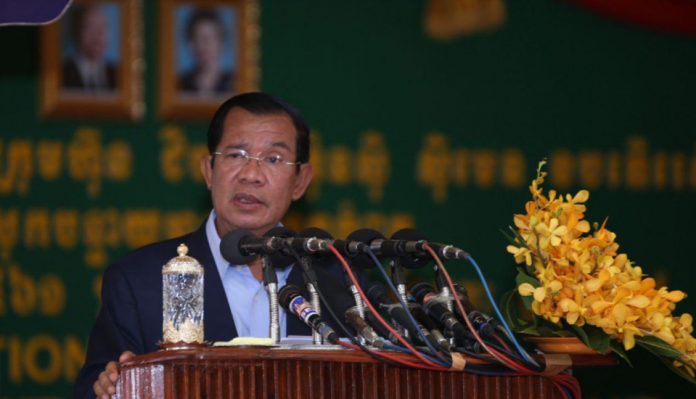 Not Ambition for Heavy Industry
Not Ambition for Heavy Industry
We are proud today that the Kingdom of Cambodia has scored another achievement. We are putting into operation the biggest cement factory in the province of Kampot. Economic advancements scored in the previous fifth terms since 2013 up to the present 2016-17 strong economic growth allows our country to continue steadfastly, in confidence and firmness. In just two years after Samdech Vibol Sena Pheakdei Say Chhum launched the groundbreaking in 2016, in 2018, we are here again to launch the inauguration. In fact, the factory has already launched its production at a rate of five thousand tons per day or roughly equal to 1.7 million tons per annum […]
I am taking this opportune moment to express my appreciation for the Chip Mong Group in the Kingdom of Cambodia who owns 60% of the share, and the Siam City Cement who owns the other 40% of the share for putting together a sum of 262 million USD in this investment. It could be considered as a major investment in heavy industry in the Kingdom, along with some other heavy industries already put into operation. We do not bear ambition to go for heavy industry but we have requirement to respond to Cambodia’s actual demands and since it is what we can do […]
Peace – Gold and Diamond Opportunity
As Prime Minister who led the country from bare hands and war, we brought an end to the war in this place in 1996, after we launched successfully the win-win policy in Oral area, in Pailin, and later in Ta Ken Koh Sla and Phnom Voar. Should the country be at war, there would not be factory in this place. As of present, there are three cement factories in the province of Kampot, and a hydropower too. These are fruits we are picking from our hard-won peace through the win-win policy that was realized for the first time in the past period of five hundred years of the Cambodian history, ending divisions, reuniting the country under HM the King, one Constitution, one National Assembly, one Royal Government and armed force. This is nothing but gold and diamond opportunity for us […]
Economic Interactions from Kampot’s Cement
… As we can see, this is not an issue of finding jobs for about 400 workers in the factory […] interactions from these factories – for instance this one that produces 1.7 million tons of cement per annum or five thousand tons per day – would bear impacts on jobs in constructions too. People also need to build homes. Buddhist monks need to build temples and residential halls. There will be growing demand for cement. As we can see now for some of the roads that we are building, we also make them concrete. Interactions from cement production in Kampot are obvious in construction, etc.
As for service sector, we also have those retailers and wholesalers in the whole country. How many jobs would that create further? How much tax would the state earn? However, more important things are trades and jobs for people […] I wish to assure my appreciation for collaboration on rail issue to alleviate our concerns on transportation of cement by roads that could be a major cause for roads damages […] the cement corporation would also sponsor concerts and boxing matches too […] for which many would benefit from them […] we shall include also the fact that we are holding back our foreign exchange that we used to purchase cement from abroad. The state will also benefit from tax such as VAT, for which every consumer will have to pay […]
Local Investors Making Local and External Investments
… In 1979, some might have hidden gold from the regime of Pol Pot’s genocide. Most of us came back with bare hands. As of this time, Cambodian investors have hundreds of millions of USD to join hand with foreign investors to make businesses in the country and/or to do it alone. Cambodia also has its investors in Laos. Some have made their business study in Myanmar and Timor Leste […] these should have indulged us to think what have brought us to this phase? It was not easy and I am taking this opportune moment to express my sincere thanks, particularly to the people in Kampot, and the Cambodian people in the whole country, for always supporting the Cambodian People’s Party, and my candidacy as Prime Minister to continue to lead the Royal Government of Cambodia […]
Trading Life to Liberate, to Make Peace and to Reunite Country
One should just see that in my tenure of 33 years, what have happened on this land. From a country that was torn by war, we have now a country that is in peace and full reunification, without secessions. Firstly, I traded my life to liberate the country from the regime of Pol Pot. Secondly, I traded my life again by going into the Khmer Rouge’s area to encourage trust to create win-win situation for peace and national reconciliation. In the economic context, we embarked on economic reforms to free market economy while some countries were still following centrally planned economy or socialist economy […] I had offered chances in my leadership to let the private sector to grow and make progress thereon […]
In fact, I used to visit the factory Chakrey Ting, and HE Cham Prasidh was with me. We discussed this idea of restoring the Chakrey Ting cement factory with former Soviet leaders. A Deputy Prime Minister told me that to restore the factory would cost more than importing cement from North Korea to address the Cambodian need […] we imported cement from the Soviet Union then, but the Soviet Union bought them from North Korea. In those days, North Korea and Cambodia were not in tune […]
Don’t Be Confused that Paris Peace Agreement Bring Market Economy to Cambodia
Since 1990s, we started to privatize state factories because the time had come and we had opened our economy. Though there were not yet big investors from outside, there were gradual flows of investments into Cambodia. From then on, the Cambodian economy grows. People may not be confused that the Paris Peace Agreement bring free market economy to Cambodia. Some had said so. They should be aware that Cambodia embarked on market economy way before that.
We started with centrally planned economy. We had no choice. After the fall of Pol Pot, a majority of people had no means of productions […] we had to gather them in families grouping – what we called solidarity group – to start production in agriculture. In industry, no investors would come to Cambodia. We had to do it by ourselves. The only factory that ran with profits was the cigarette factory. As for others, we operated at loss. We had to force ourselves to do it. Our country was in a mixed state of war and peace. Peace prevailed for major parts of our land and time, while war did for some of the land and time, had caused negative impacts on the country’s socio-economic development. Gradually, we had propped up the private sector to stand firm. We also distributed land to and issue land titles for people. It is in this development that some Cambodians had bought so many lands and made themselves rich later from selling them […]
More Laws as Promised
To have arrived here today, it was not a normal journey. We have liberalized our economy from mid 1980s. We are in process of perfecting our market economy since 1991-92 … Last week, the Cabinet passed a law on Medical Licenses that we had promised to do it to the World Bank. We will continue to pass laws concerning lawyers too. Whatever we promised to the World Bank, we must make them happen because they are conditions for free and open economy […] I still believe that protectionism policy will not be successful. Each country cannot survive alone. There must be cooperation. A country needs to export its goods to another country, and import goods from other countries too […] No one could prevent private companies from trading with whoever they need to. Prevention would mean dictatorship and frustrate free trade […]
Demand for Cement Will Grow in Future
… In the time to come, particularly in Cambodia, demand for cement will grow. In Cambodia, there were no high demand for cement because we had so much woods. Our people would build homes from wood. As of present, cost of cement and steel are lower than wood. People resort to building homes from cement. Buddhist monks too build large residential hall of dozens of rooms. Use of wood for construction has reduced, and we are also taking stern measures to conserve woods and prevent logging as well. While we built hospitals, pagodas, schools, etc. from woods before, we are now resorting to cement. It is on this note that there will be growing demand for cement. In our country, if you notice, in certain place, if you fail to go in one month or so, your eyes would catch a spectacular difference from new buildings going up. More so, we also build certain road with concrete too […]
Demand for cement in the world is going high. Every country has their construction requirements. However, we have noticed that some have saved up their raw materials. They imported cement from other countries. They would go to other country to drill for fossil fuel. They keep their resources untouched […] according to HE Suy Sem, Minister of Mines and Energy, we can produce cement from this location at a rate of two million tons per annum for 100 years. We must also define clearly issues relating to our production and our demand for local construction and export […]
National Road 3 – Four Lanes to Baek Kus
… From helicopter, the bird-eye view allows me to see many achievements we had placed in Kampot. First of all, we have this cement production site. Secondly, Kampot has known to be a salt production province. It was because of this significance that I had brought this issue of the National Road 3 with former President Roh Moo-hyun, and later with President Lee Myung-bak on ground that it would carry salt to every parts of the country. We will build national road 3 into four lanes from Baek Chan to Baek Kus and also widen roads from thereon […] to Kampot […]
I hope that people in Kampot will make further efforts altogether to make our families living conditions better, and to ensure our nation’s development. First of all, we must talk about personal and family life. Once they develop, nation will accordingly. Our economy is rising and we must not cause it to go back down. Our growth in the last two consecutive decades has been 7.7%, and we will continue to ensure its growth at 7%. With more income, our farmers and workers of every sectors will benefit from peace and development.
Continue Journey with People Another Ten Years
I will continue to journey with our people in the whole Kingdom for another ten years. Those who wish to replace me be understanding. They do not have ability to control and manage Cambodia’s situation yet. All you know was to ignite a war, to scold and to insult. You can’t control even a party or community. As for Hun Sen, I have experience of at least 39 years, and 33 of which was in capacity of Prime Minister. To go on for another ten years, it will add up to 43 years. It will not be too late or too old. I hope that people in Kampot will continue to vote for the Cambodian People’s Party to enable me to continue to be Prime Minister […]./.






